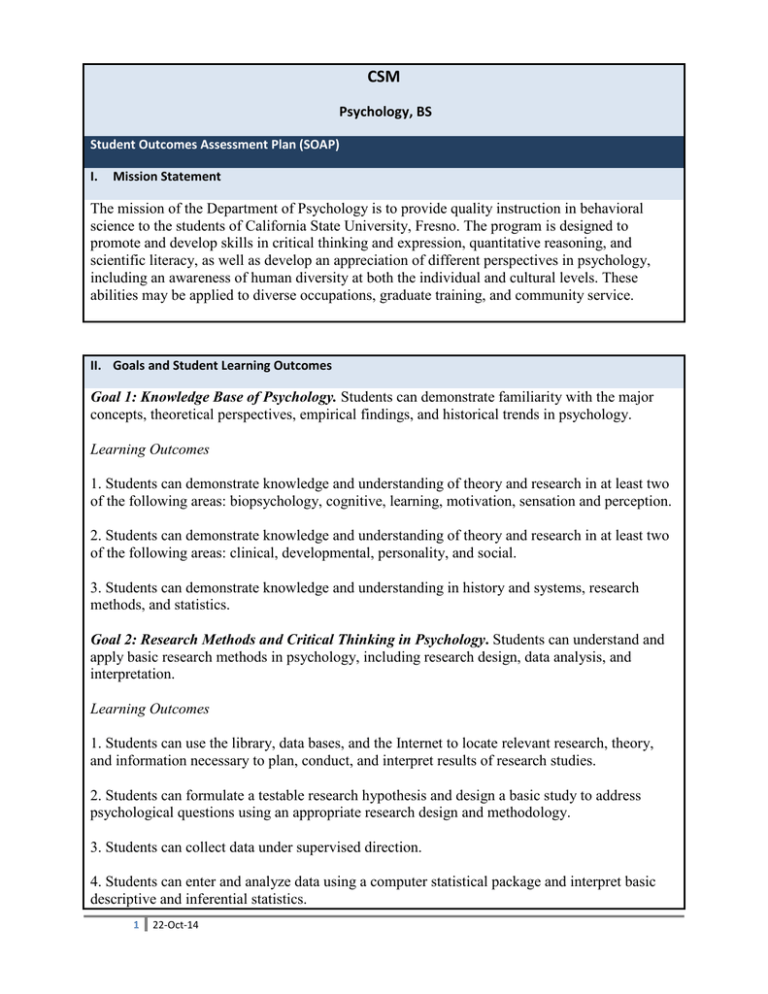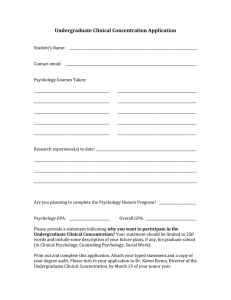CSM
advertisement

CSM Psychology, BS Student Outcomes Assessment Plan (SOAP) I. Mission Statement The mission of the Department of Psychology is to provide quality instruction in behavioral science to the students of California State University, Fresno. The program is designed to promote and develop skills in critical thinking and expression, quantitative reasoning, and scientific literacy, as well as develop an appreciation of different perspectives in psychology, including an awareness of human diversity at both the individual and cultural levels. These abilities may be applied to diverse occupations, graduate training, and community service. II. Goals and Student Learning Outcomes Goal 1: Knowledge Base of Psychology. Students can demonstrate familiarity with the major concepts, theoretical perspectives, empirical findings, and historical trends in psychology. Learning Outcomes 1. Students can demonstrate knowledge and understanding of theory and research in at least two of the following areas: biopsychology, cognitive, learning, motivation, sensation and perception. 2. Students can demonstrate knowledge and understanding of theory and research in at least two of the following areas: clinical, developmental, personality, and social. 3. Students can demonstrate knowledge and understanding in history and systems, research methods, and statistics. Goal 2: Research Methods and Critical Thinking in Psychology. Students can understand and apply basic research methods in psychology, including research design, data analysis, and interpretation. Learning Outcomes 1. Students can use the library, data bases, and the Internet to locate relevant research, theory, and information necessary to plan, conduct, and interpret results of research studies. 2. Students can formulate a testable research hypothesis and design a basic study to address psychological questions using an appropriate research design and methodology. 3. Students can collect data under supervised direction. 4. Students can enter and analyze data using a computer statistical package and interpret basic descriptive and inferential statistics. 1 22-Oct-14 5. Students can apply APA ethical guidelines in the design, data collection, analysis, interpretation, and reporting of psychological research. 6. Students can write an APA style empirical research report, demonstrating an understanding of the various sections the report, including the introduction, method, results, and discussion. Goal 3: Career Preparation and Development. Develop basic written and oral presentation skills and obtain an understanding of the range of career and advanced educational opportunities available to those with a degree in Psychology. Learning Outcomes 1. Demonstrate effective written communication skills. 2. Demonstrate effective oral presentation skills. 3. Demonstrate numerical literacy. 4. Understand the field and educational experience required for potential careers, including, for example, counselor, social worker, clinical psychologist, psychiatrist, university professor, school psychologist, applied behavior analyst, and special education teacher. 2 22-Oct-14 III. Curriculum Map (Matrix of Courses X Learning Outcomes) Course 10 36 42 121 122 123 124 125 126 128 136 143 144 145 149 154 155 156 162 166 169 172 175 176 177 179 182 184 1.1 I E 1.2 I E R R 2.1 2.2 2.6 3.1 I 3.2 I E E E E E E E E E 1.3 I Goals / Outcomes 2.3 2.4 2.5 E E E E E R E R R R 3.4 I I E R E E E I E E R I E R R E E R R 3.3 E R R Notes: I = Introduced, E = Emphasized, R = Reinforced. The approach taken here is conservative. A course is considered to address an objective only when the standard approach to that course across all instructors addresses that objective. Individual sections of these courses address more objectives than the ones shown here. 3 22-Oct-14 IV. Assessment Methods A. Direct Measures 1. Psychology Major Exam – This test will be given at least once per year in Psychology 182, a culminating course required of all majors. The test assesses areas in Psychology deemed important by faculty of graduating Psychology majors. The exam will allow us to assess overall performance in Psychology and determine how our students perform in the various content areas. Specially, the exit exam assesses the following areas: − − − − − − − − − − − − Biopsychology Cognitive Learning Motivation Sensation and Perception Clinical Developmental Personality Social History and Systems Research Methods Statistics 2. Psychology 144 Research Papers – All students write an APA style empirical research report in Psychology 144. Samples of these will be evaluated according to a rubric to assess our research methods and critical thinking objectives. 3. Psychology 144 Presentations – Most Psychology 144 students present the results of their class-required empirical research studies in the form of a poster presentation. Random samples of posters will be evaluated according to a rubric to assess oral presentation quality, writing quality, and numerical literacy. B. Indirect Measures 1. Senior (Exit) Survey – We will administer a senior survey to assess student perceptions of learning, satisfaction with the program, and objectives related to personal and career development. 2. Undergraduate Alumni Survey – We have constructed an alumni survey, which we are using to assess perceptions of student learning, satisfaction, and objectives related to personal and career development. This also allows us to track the success of our students after they complete our program. 4 22-Oct-14 V. Student Learning Outcomes X Assessment Methods Matrix Goals/Objectives Exit Exam 1.1 1.2 1.3 X X X 144 Papers 2.1 2.2 2.3 2.4 2.5 2.6 3.1 X X X X X X X 3.2 X X Alumni Survey X X 144 Presentations X X VI. Timeline for Implementation of Assessment Methods and Summary Evaluations 5 22-Oct-14 14-15 AY 15-16 AY 16-17 AY 17-18 AY 18-19 AY 19-20 AY X X X X X X X X X X X X X X X X X X X 3.4 X Exit Survey Exit Exam 144 Papers Exit Survey Alumni Survey 144 Presentations 3.3 X X X X VII. Process for Closing the Loop In the Department of Psychology, we have an Undergraduate Committee responsible for monitoring the undergraduate program, suggesting curriculum and other catalog changes, and reviewing changes proposed by others. The Chair of this committee is also the Assessment Coordinator. The members of the Undergraduate Committee are responsible for designing and carrying out assessment activities with the help of the entire faculty as needed. The Undergraduate Committee also analyzes the resulting data and suggests changes to the program as necessary. Assessment data and suggested program changes are presented to the entire faculty in the monthly faculty meeting, and the entire faculty decides whether to implement any changes (and they are also free to suggest their own changes). 6 22-Oct-14





